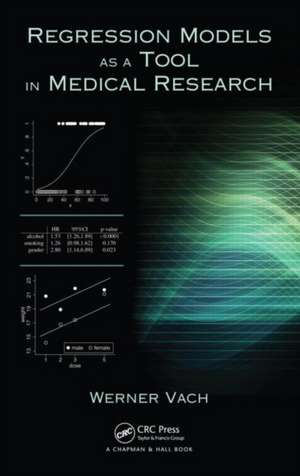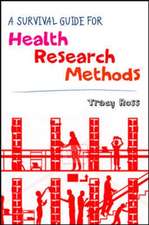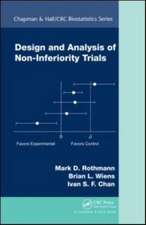Regression Models as a Tool in Medical Research
Autor Werner Vachen Limba Engleză Hardback – 27 noi 2012
After reviewing popular models and basic methods, the book focuses on advanced topics and techniques. It considers the comparison of regression coefficients, the selection of covariates, the modeling of nonlinear and nonadditive effects, and the analysis of clustered and longitudinal data, highlighting the impact of selection mechanisms, measurement error, and incomplete covariate data. The text then covers the use of regression models to construct risk scores and predictors. It also gives an overview of more specific regression models and their applications as well as alternatives to regression modeling. The mathematical details underlying the estimation and inference techniques are provided in the appendices.
| Toate formatele și edițiile | Preț | Express |
|---|---|---|
| Paperback (1) | 299.52 lei 6-8 săpt. | |
| CRC Press – 21 ian 2023 | 299.52 lei 6-8 săpt. | |
| Hardback (1) | 714.19 lei 6-8 săpt. | |
| CRC Press – 27 noi 2012 | 714.19 lei 6-8 săpt. |
Preț: 714.19 lei
Preț vechi: 870.96 lei
-18% Nou
Puncte Express: 1071
Preț estimativ în valută:
136.66€ • 146.14$ • 113.94£
136.66€ • 146.14$ • 113.94£
Carte tipărită la comandă
Livrare economică 17 aprilie-01 mai
Preluare comenzi: 021 569.72.76
Specificații
ISBN-13: 9781466517486
ISBN-10: 1466517484
Pagini: 496
Ilustrații: 158 black & white illustrations, 94 black & white tables
Dimensiuni: 156 x 234 x 33 mm
Greutate: 0.84 kg
Ediția:New.
Editura: CRC Press
Colecția CRC Press
ISBN-10: 1466517484
Pagini: 496
Ilustrații: 158 black & white illustrations, 94 black & white tables
Dimensiuni: 156 x 234 x 33 mm
Greutate: 0.84 kg
Ediția:New.
Editura: CRC Press
Colecția CRC Press
Public țintă
Graduate students in medical school; medical and experimental researchers, clinicians, and epidemiologists.Cuprins
THE BASICS: Why Use Regression Models? An Introductory Example. The Classical Multiple Regression Model. Adjusted Effects. Inference for the Classical Multiple Regression Model. Logistic Regression. Inference for the Logistic Regression Model. Categorical Covariates. Handling Ordered Categories: A First Lesson in Regression Modeling Strategies. The Cox Proportional Hazard Model. Common Pitfalls in Using Regression Models. ADVANCED TOPICS AND TECHNIQUES: Some Useful Technicalities. Comparing Regression Coefficients. Power and Sample Size. The Selection of the Sample. The Selection of Covariates. Modeling Nonlinear Effects. Transformation of Covariates. Effect Modification and Interactions. Applying Regression Models to Clustered Data. Applying Regression Models to Longitudinal Data. The Impact of Measurement Error. The Impact of Incomplete Covariate Data. RISK SCORES AND PREDICTORS: Risk Scores. Construction of Predictors. Evaluating the Predictive Performance. Outlook: Construction of Parsimonious Predictors. MISCELLANEOUS: Alternatives to Regression Modeling. Specific Regression Models. Specific Usages of Regression Models. What Is a Good Model? Final Remarks on the Role of Prespecified Models and Model Development. MATHEMATICAL DETAILS: Mathematics behind the Classical Linear Regression Model. Mathematics behind the Logistic Regression Model. The Modern Way of Inference. Mathematics for Risk Scores and Predictors. Bibliography. Index.
Notă biografică
Werner Vach is a professor of medical informatics and clinical epidemiology at the University of Freiburg. Dr. Vach has co-authored more than 150 publications in medical journals. His research encompasses biostatistics methodology in the areas of incomplete covariate data, prognostic studies, diagnostic studies, and agreement studies.
Recenzii
"The book can be recommended as a useful overview of practical aspects of regression modeling, very suitable for medical researchers who want to apply statistical methods or do apply them already now. It is also very suitable for students of statistics and their teachers."
—ISCB News, 59, June 2015
"With its focus on conceptual understanding and practical applications, this book is highly recommended to medical and other health science researchers who desire to improve their understanding of regression analysis for a better understanding of medical literature, for the adequate presentation of their own regression outcomes, or for improved interpretation of their results for publications and presentations. … Additionally, this book can serve as supplemental reading for an applied graduate level course on general regression models."
—Journal of Agricultural, Biological, and Environmental Statistics
"The book can be a very helpful contribution especially for researchers in medical sciences when performing their statistical analyses and trying to interpret the results obtained. … This book provides plenty of practical knowledge about these basic models and also some of their extensions that is often not easy to find from statistical textbooks or from software manuals. The basic methods are well explained and illustrated by numerous practical examples, mainly using simulated datasets."
—Tapio Nummi, International Statistical Review
—ISCB News, 59, June 2015
"With its focus on conceptual understanding and practical applications, this book is highly recommended to medical and other health science researchers who desire to improve their understanding of regression analysis for a better understanding of medical literature, for the adequate presentation of their own regression outcomes, or for improved interpretation of their results for publications and presentations. … Additionally, this book can serve as supplemental reading for an applied graduate level course on general regression models."
—Journal of Agricultural, Biological, and Environmental Statistics
"The book can be a very helpful contribution especially for researchers in medical sciences when performing their statistical analyses and trying to interpret the results obtained. … This book provides plenty of practical knowledge about these basic models and also some of their extensions that is often not easy to find from statistical textbooks or from software manuals. The basic methods are well explained and illustrated by numerous practical examples, mainly using simulated datasets."
—Tapio Nummi, International Statistical Review
Descriere
While regression models have become standard tools in medical research, understanding how to properly apply the models and interpret the results is often challenging for beginners. This text presents the fundamental concepts and important aspects of regression models most commonly used in medical research, including the classical regression model for continuous outcomes, the logistic regression model for binary outcomes, and the Cox proportional hazards model for survival data. The author emphasizes adequate use, correct interpretation of results, appropriate presentation of results, and avoidance of potential pitfalls.











